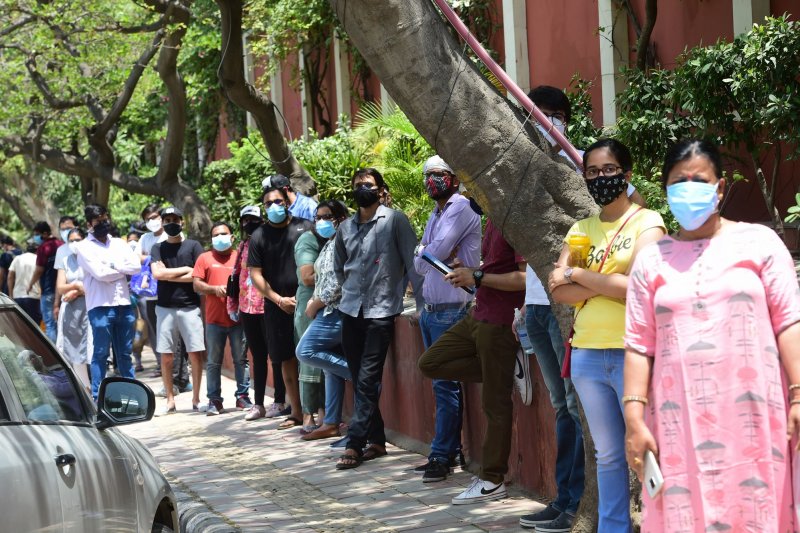1 of 5 | People wait for hours to receive COVID-19 vaccine doses at one of the largest vaccination sites at Radhaswami Satsang in New Delhi, India, in May. The World Health Organization said Monday that 11 billion vaccine doses are needed to end the pandemic by next June. File Photo by Abhishek/UPI |
License Photo
June 15 (UPI) -- The World Health Organization said COVID-19 is spreading faster than the global distribution of vaccines and that while it welcomes the G7's commitment to share hundreds of millions of doses, more is needed to end the pandemic.
Tedros Adhanom Ghebreyesus, director general of the WHO, told reporters from the agency's Geneva, Switzerland, headquarters on Monday that the G7's pledge to provide a billion doses in the next two years is a big help, but many more are required.
He said to end the pandemic by next year's G7 summit in Germany, 11 billion doses are needed.
"We need more, and we need them faster," he said. "Right now, the virus is moving faster than the global distribution of vaccines."
He said there are enough doses to drive down transmission and save lives if only they were distributed to where they are needed -- and not next year, but now.
The urgency comes amid the spread of highly contagious variants of the virus that threaten the efficacy of current vaccines. Despite the number of new COVID-19 cases dropping globally, deaths have not dropped as fast and the overall decline masks increases in many other countries, such as those in Africa, he said.
Citing a recent Lancet article, Tedros said African nations have the highest global mortality rate among critically ill COVID-19 patients while having fewer cases than most all other regions.
"More than 10,000 people are dying every day," he said. "During this press conference alone, more than 420 people will die. These communities need vaccines, and they need them now, not next year."
He added that some countries have been successful at keeping the virus in check without vaccines, but the threat of the variants means they will have to implement even more stringent measures and for longer.
Tedros made the call to action after the G7 leaders in Britain pledged to donate an additional 870 billion vaccine doses over the weekend for a total of 1 billion promised since last February to WHO's COVAX facility, which aims for equitable access to COVID-19 vaccines.
The countries said in a statement that it is their international priority "to accelerate the rollout of safe and effective, accessible and affordable vaccines for the poorest countries."
WHO and the United Nations, organizations that have been warning against vaccine nationalism and say the pandemic will not be over until it's over globally, described the G7 commitment as "a landmark agreement."
"This is an important moment of global solidarity and a critical milestone in the push to ensure those most at risk everywhere are protected," said Dr. Seth Berkley, the chief executive of the Vaccine Alliance, which is working with the WHO on the COVAX Facility. "As we strive toward our goal of ending the acute phase of the pandemic, we look forward to working with countries to ensure these doses pledged are quickly turned into doses delivered."
However, following the announcement, some human rights groups criticized the G7 for not doing enough.
Oxfam International chastised the group for falling well short of not only what the moment requires but also of donating an additional 1 billion doses.
"They say they want to vaccinate the world by the end of next year, but their actions show they care more about protecting the monopolies and patents of pharmaceutical giants," Max Lawson, head of inequality policy at Oxfam, said in a statement. "A billion vaccine doses would have been a drop in the bucket, but they didn't even manage that."
The Britain-based charitable organization called on all G7 nations to to back a wavier on vaccine intellectual property.
"By holding vaccine recipes hostage, the virus will continue raging out of control in developing countries and put millions of lives at risk," Lawson said.
Homeless and migrant laborers affected by the COVID-19 lockdown queue up to receive free cooked food distributed by Sikh volunteers in New Delhi, India, on May 18, 2021. Photo by Abhishek/UPI |
License Photo
















